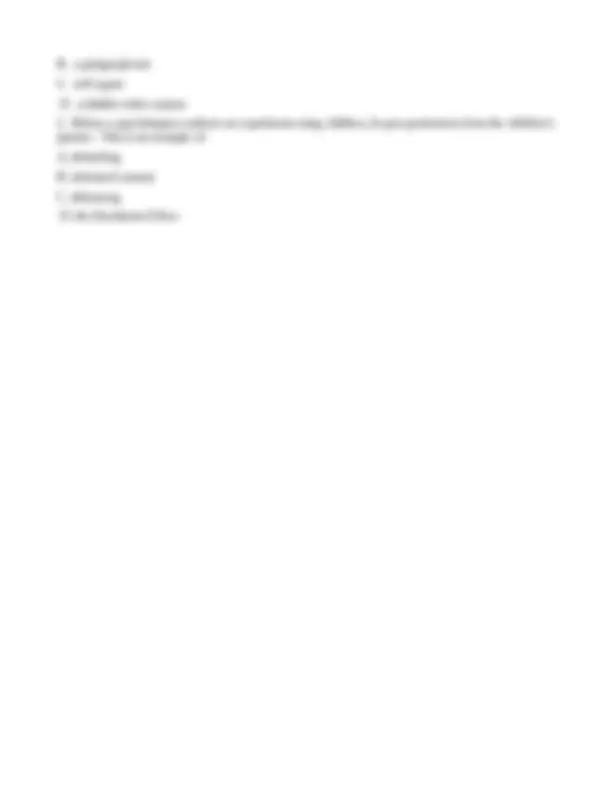



Study with the several resources on Docsity

Earn points by helping other students or get them with a premium plan


Prepare for your exams
Study with the several resources on Docsity

Earn points to download
Earn points by helping other students or get them with a premium plan
Community
Ask the community for help and clear up your study doubts
Discover the best universities in your country according to Docsity users
Free resources
Download our free guides on studying techniques, anxiety management strategies, and thesis advice from Docsity tutors
A study guide for exam #1 in introduction to psychology course taught by dr. Rick frei during spring 2011 semester. The guide includes exam format, textbook chapters, and an overview of topics covered in the exam. It also provides studying tips and sample essay and multiple choice questions.
Typology: Study notes
1 / 3

This page cannot be seen from the preview
Don't miss anything!


Introduction to Psychology Study Guide for Exam # Dr. Rick Frei Spring 2011 Exam Date: If your class meets on… Exam #1 will be on… MWF 12:20-1:15PM Friday, February 4 th at 12:20PM MWF 1:25-2:20PM Friday, February 4 th at 1:25PM TR 11:00-12:20PM Thursday, February 3 rd at 11:00AM M 6:30-9:25PM Monday, February 7 th at 6:30PM Exam Format : Part I has 40 questions: a) thirty-five multiple choice questions and five true/false questions. Each question is worth one point each. Part II consists of three short answer essay questions, of which you must do two. Each is worth five points each. Part I: 40 points Part II: 10 points 50 points / 5 = 10 points total for Exam # Textbook Chapters for Exam #1: H&H Chapter 1: Introduction and Research Methods Overview of lecture topics covered on Exam #1 : Topic #1: Introduction to Psychology Definition of psychology, different types of behavior (voluntary, involuntary), mental processes (dreaming, thinking, memory, decision-making, attitudes/opinions), physiology and philosophy, four goals of psychology (description, explanation, prediction, control), correlation vs. causality, major perspectives in psychology (ie., psychodynamic, biological, behavioral, cross-cultural etc.), nature vs. nurture, observation as a tool for studying human behavior, Hawthorne Effect, naturalistic observation, self-report (surveys, interviews, asking people about their behavior and mental processes), social desirability (lying to make yourself look better vs. feel better about your bad behavior), lying to make yourself look worse. Topic #2: Psychology as a Science Science vs. pseudoscience, scientific method, theory, hypothesis, the experimental method, independent and dependent variables, experimental group, control group, placebo group, populations, samples, representativeness, generalization, analyzing results, publishing findings, replication. Topic #3: Psychology as a Profession What is a profession? Careers in psychology (ie., clinical, industrial/organizational, forensic psychology, health psychology etc.), ethics (goal: trust in the profession), dual relationships, informed consent (history behind it, what is it? who can/cannot give informed consent? Who is “iffy”? When is informed consent not needed?
Studying Tips Start with this : This study guide should be your main source for organizing your notes and your readings. A general rule of thumb is this: If there is a word or a definition or a concept that is included on this study guide that you don’t understand, you will probably get a corresponding question wrong on the exam. Get missed lecture notes : If you missed any lectures, you need to make sure that you get the notes from someone in class. Otherwise, your chances of passing the exam are slim. There are no dates (years) on the exam and I will only include a psychologist’s name if I mentioned him/her in class. Approximately 60% of the exam questions were at least mentioned in lecture. Studying your Lecture Notes : First, use this study guide to make sure that you haven’t missed any major points from lecture. Many students recopy their notebook as a method of remembering the things that were covered in lecture. Make sure that you are not just recopying the material, but also reading and understanding it. For example, many of the questions involve examples of terms or definitions. A good way to recopy your notebook is to create an example for every concept that I covered in class. For example, create an example of social desirability or correlation. If you can create an example, it shows that you understand the concept. Index cards (where you write a term on one side and the definition WITH AN EXAMPLE on the other) are also an effective study tool. Leave the cards next to the toilet and quiz yourself when you go to the bathroom. Studying the textbook/readings/videos : When choosing things from the chapter to put on the exam, I focused on material that was related to things I covered in class (where do the textbook and my notes overlap?). For example, I talked about using variables in experiments during lecture. However, your textbook also talks about extraneous variables, which I did not mention in class. You should make sure you know these related topics. Another example: I talked about ethics in class. However, I did not talk about ethical considerations when using animals in research. My rule of thumb is this: Open up your notebook and open up your textbook and see where the two overlap. Then read the paragraph above and the paragraph below in your textbook to identify related topics. Doh!: “Doh!” is what Homer Simpson says when he does something stupid. Many of you will lose points on the exam because you will skip questions or leave questions blank. DO NOT DO THIS! You get no points for skipped/unanswered questions. Please make sure you go over your exam carefully before handing it in to make sure you didn’t miss any multiple choice or true/false questions. Sample Short Answer Essay Questions: